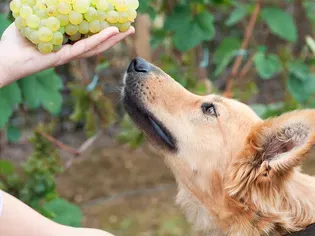Can Dogs Eat Grapes?
Updated on 05/26/24

Can Dogs Eat Grapes? Unraveling the Truth Behind a Canine Conundrum
Introduction
The question of whether dogs can eat grapes has perplexed pet owners for generations, with conflicting information often circulating. Some sources claim that grapes are harmless treats, while others warn of their potential toxicity. To unravel the truth behind this canine conundrum, this comprehensive guide delves into the scientific evidence, explores the risks associated with grape consumption, and provides practical advice on keeping your furry friend safe.
The Science Behind Grape Toxicity
Grapes, along with raisins (which are dried grapes), contain a toxic substance called tartaric acid. While humans can safely consume these fruits, dogs lack the necessary enzymes to metabolize this compound. As a result, tartaric acid can accumulate in a dog's bloodstream, leading to a condition known as grape toxicity.
Symptoms of Grape Toxicity
The severity of grape toxicity depends on the quantity and type of grape consumed. Symptoms can range from mild to severe and may include:
* Vomiting
* Diarrhea
* Lethargy
* Abdominal pain
* Tremors
* Seizures
* Kidney failure
Examples of Grape Toxicity
Numerous anecdotal and clinical reports have documented cases of grape toxicity in dogs. For instance, a study by the Animal Poison Control Center of the American Society for the Prevention of Cruelty to Animals (ASPCA) found that over 93% of dogs who ingested grapes experienced at least one symptom of toxicity.
In one particularly severe case, a golden retriever named Cooper consumed 10 ounces of raisins and subsequently developed acute kidney failure. Despite aggressive treatment, Cooper's kidneys did not recover, and he sadly passed away.
Risk Factors for Grape Toxicity
While all dogs are at risk of grape toxicity, certain factors can increase their susceptibility:
* Breed: Some breeds, such as Labs, Goldens, and Bulldogs, may be more susceptible to grape toxicity.
* Size: Smaller dogs are at greater risk due to their lower body weight.
* Health Conditions: Dogs with pre-existing kidney disease may be more likely to experience severe symptoms.
Diagnosis and Treatment of Grape Toxicity
If you suspect your dog has ingested grapes, it is crucial to seek immediate veterinary attention. The veterinarian will perform a blood and urine test to assess your dog's kidney function and determine if grape toxicity is present.
Treatment for grape toxicity typically involves inducing vomiting and administering activated charcoal to absorb any remaining toxins. In severe cases, intravenous fluids and dialysis may be necessary to support kidney function.
Prevention is Key
The best way to protect your dog from grape toxicity is to prevent them from consuming grapes in the first place. Keep grapes and raisins out of reach and supervise your dog when they are in areas where grapes may be present, such as parks or picnic areas.
Alternative Treats for Dogs
If you want to treat your dog to a sweet snack, there are numerous healthy alternatives to grapes, including:
* Bananas
* Blueberries
* Strawberries
* Apples (without seeds)
* Carrots
* Sweet potatoes
Conclusion
While grapes may be a delicious treat for humans, they are potentially toxic to dogs. Understanding the science behind grape toxicity and the risk factors involved is essential for responsible pet ownership. By following the advice outlined in this guide, you can keep your furry friend safe and prevent this potentially life-threatening condition. Remember, if you ever suspect your dog has ingested grapes, prompt veterinary attention is crucial.
Explore More Pets

Basic Training
Puppy and Baby Introductions

Working Dog Breeds
All About Search and Rescue Dogs

Dog Treatments
Puppy Vaginitis: Signs, Causes and Treatment

Dog Adoption
After More Than 1,200 Days in the Shelter, Coco Goes Home

Basic Training
How to Train Your Puppy to Go on Potty Pads

Hybrid Dog Breeds
The Difference Between a Mutt, Mixed Breed, or Designer Dog?

Dog Treatments
Nail Problems in Dogs

Puppies
7 Reasons Why Two Dogs Are Better Than One
